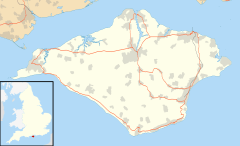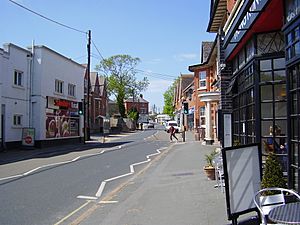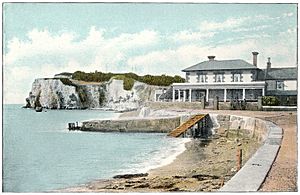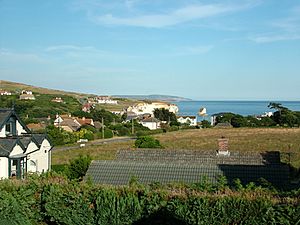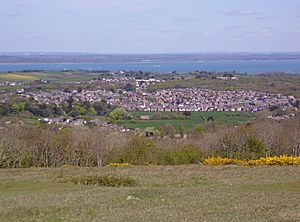Freshwater, Isle of Wight facts for kids
Quick facts for kids Freshwater |
|
|---|---|
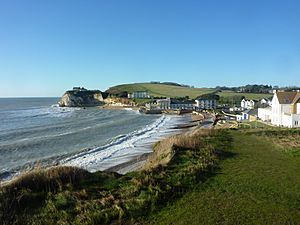 Freshwater Bay, December 2013 |
|
| Area | 5.59 sq mi (14.5 km2) |
| Population | 5,369 (2011 census) |
| • Density | 960/sq mi (370/km2) |
| Civil parish |
|
| Unitary authority | |
| Ceremonial county | |
| Region | |
| Country | England |
| Sovereign state | United Kingdom |
| Post town | FRESHWATER |
| Postcode district | PO40 |
| Dialling code | 01983 |
| Police | Hampshire |
| Fire | Isle of Wight |
| Ambulance | Isle of Wight |
| EU Parliament | South East England |
| UK Parliament |
|
Freshwater is a big village located at the western end of the Isle of Wight, England. It's known for its beautiful coast. The southern part of the village is called Freshwater Bay. This area is a popular spot for tourists.
Freshwater is famous for its tall chalk cliffs. A famous scientist named Robert Hooke was born here. Also, Alfred Lord Tennyson, a well-known Poet Laureate, lived in Freshwater.
Contents
Exploring Freshwater's Natural Beauty
Freshwater is famous for its amazing geology. The rocks and cliffs here have been shaped over many years by coastal erosion.
Cool Rock Formations
One well-known rock was called "Arch Rock." It looked like an arch, but it fell down on October 25, 1992. Another rock nearby is called "Stag Rock." People say a stag (a male deer) once jumped onto this rock from the cliff to escape hunters.
A huge piece of the cliff fell off in 1968. Now, it's known as "Mermaid Rock." Right behind Mermaid Rock, there's a small Sea cave. It goes several meters into the cliff.
Freshwater Beach Fun
Freshwater's beach is a favorite spot for both tourists and local people. It's mostly sandy, but you'll also find chalk from the nearby cliffs. Many visitors like to collect these chalk pieces as souvenirs.
The Albion Hotel
Freshwater has a great example of an old Victorian beach hotel called The Albion. It was built when Freshwater became a popular place for holidays by the sea. The hotel is still popular today. Its walls facing the sea need regular repairs and repainting. This is because strong storms often hit the building with rocks and other debris.
Hills and Views
The hills above Freshwater are named after the poet Tennyson. On nearby Tennyson Down, there is a granite cross. It was put there in 1897 to honor Tennyson. People from Freshwater and friends from England and America helped put it up. There is also a hill called 'Hooke Hill', named after scientist Robert Hooke.
Churches and History
All Saints' Church
The All Saints' Church is one of the oldest churches on the Isle of Wight. It was even mentioned in the Domesday Book back in 1086. Mark Whatson is the current pastor. Tennyson's wife Emily and other family members are buried in the church cemetery. There's also a special memorial inside for Tennyson's son, Lionel. Lionel died from malaria in 1886.
Dimbola Lodge
Dimbola Lodge was the home of Julia Margaret Cameron, a famous photographer. Today, it's a museum about photography. You can also find a tearoom and a bookstore there. It's located in Freshwater Bay.
St. Agnes' Church
Tennyson's son, Hallam, gave land for a new church in Freshwater Bay. His wife Audrey suggested naming it after St. Agnes. St. Agnes' Church opened on August 12, 1908. It is the only church on the Isle of Wight with a thatched roof.
Freshwater's Past
Old Railway Station
Freshwater used to have the biggest station on the Freshwater, Yarmouth and Newport Railway. This train line ran from 1889 to 1953. Now, a supermarket and a garden center are in the spot where the old station used to be.
The Western Yar River
Freshwater is close to where the Western Yar river begins. This river flows north to Yarmouth. The Freshwater Marshes are a special natural area. They are protected as a Site of Special Scientific Interest and a Local Nature Reserve.
Fort Redoubt
At the western end of Freshwater Bay, on a high bluff, are the remains of Fort Redoubt. This fort was built in 1855–1856 to protect Freshwater Bay. It was used until the early 1900s. The military sold it in 1928. Today, part of it is a private home, and other parts are being turned into holiday apartments. A doorway carved into the cliff below the fort was the main way to get to the building from the beach.
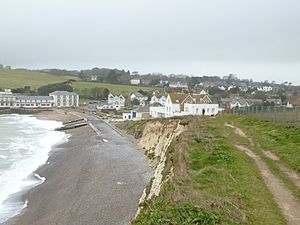
Mysterious Structures on Moons Hill
On Moons Hill in Freshwater, there are two unusual structures. People have wondered if they were ice houses, pottery kilns, or even crematories. Robert Walker first dug into them in the 1890s. He thought they showed that ancient Phoenicians had settled in Freshwater. However, scientific tests suggest they were most likely kilns used for making lime.
Community Groups
Village Associations
The Freshwater Village Association started in November 2006. It was formed by local residents who wanted to make sure Freshwater kept its village feel. The Freshwater Bay Residents Association was created earlier, in 1984. This group focuses on concerns about new buildings in Freshwater Bay.
Freshwater Lifeboat
The Freshwater Lifeboat is a special rescue group. It's based at Freshwater Bay Lifeboat Station. They use two lifeboats to help people in trouble at sea. They get their money from public donations and sales from their shop. They are not part of the larger Royal National Lifeboat Institution.
Carnival Fun
Freshwater also hosts the Freshwater and Totland Carnival every year. It's a fun event for everyone!
Robert Hooke Society
Freshwater is home to the Robert Hooke Society. This group has created a "Hooke Trail" walking path. It visits places linked to the famous scientist Robert Hooke. They also have meetings and celebrate Hooke's birthday every year.
A Look Back in Time
Ancient Settlements
There is proof that the Romans had a harbor at the end of the Western Yar river. In 530 AD, the Isle of Wight was taken over by a combined force of Saxons and Jutes. After the Norman Conquest, the Lord of the Island gave the old Saxon All Saints' Church to a Norman Abbey.
In 1623, King James I gave Freshwater Parish to a bishop. This bishop then gave Freshwater to St John's College, Cambridge.
Village Farms
The Freshwater Parish originally had five farms. These were called "tuns": Norton, Sutton, Easton, Weston, and Middleton. Most of these names are still used today. However, Sutton is now called Freshwater Bay. The first meeting of the Freshwater Parish Council was on December 31, 1894.
Things to See and Do
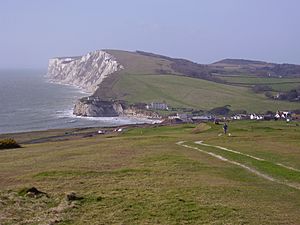
There are many interesting places to visit nearby:
- Farringford House: This was the home of the famous poet Alfred Lord Tennyson.
- Dimbola Lodge: This was the home of photographer Julia Margaret Cameron. Now it's a museum.
- West Wight Sports Centre: A place for sports and activities.
- Freshwater Bay Golf Course: A great spot for golf lovers.
- Afton Down: This was the location of the famous Isle of Wight Festival 1970.
- The Needles Old Battery: An old Victorian fort. It was also used for testing rockets after World War II.
- Needles Lighthouse: See the lighthouse and the famous chalk rocks called The Needles.
- Compton Bay: At low tide, you can see real dinosaur footprints here!
- The Longstone: About four miles away, this is the only large stone monument (a megalith) on the Island.
Not all of these attractions are exactly inside the village boundaries.
Getting Around Freshwater
Freshwater is connected to other parts of the Island by Southern Vectis buses. Route 7 and Route 12 go to Totland, Yarmouth, and Newport. In the summer, you can ride the open-top "The Needles Tour" bus. There's also the "Island Coaster" tourist bus that serves Freshwater Bay. Freshwater is also part of the Isle of Wight Coastal Path, which is great for walking.
See also
 In Spanish: Freshwater para niños
In Spanish: Freshwater para niños


